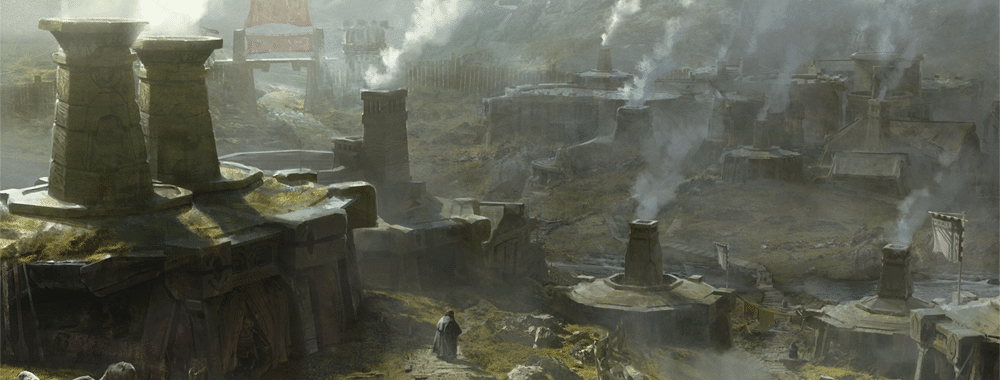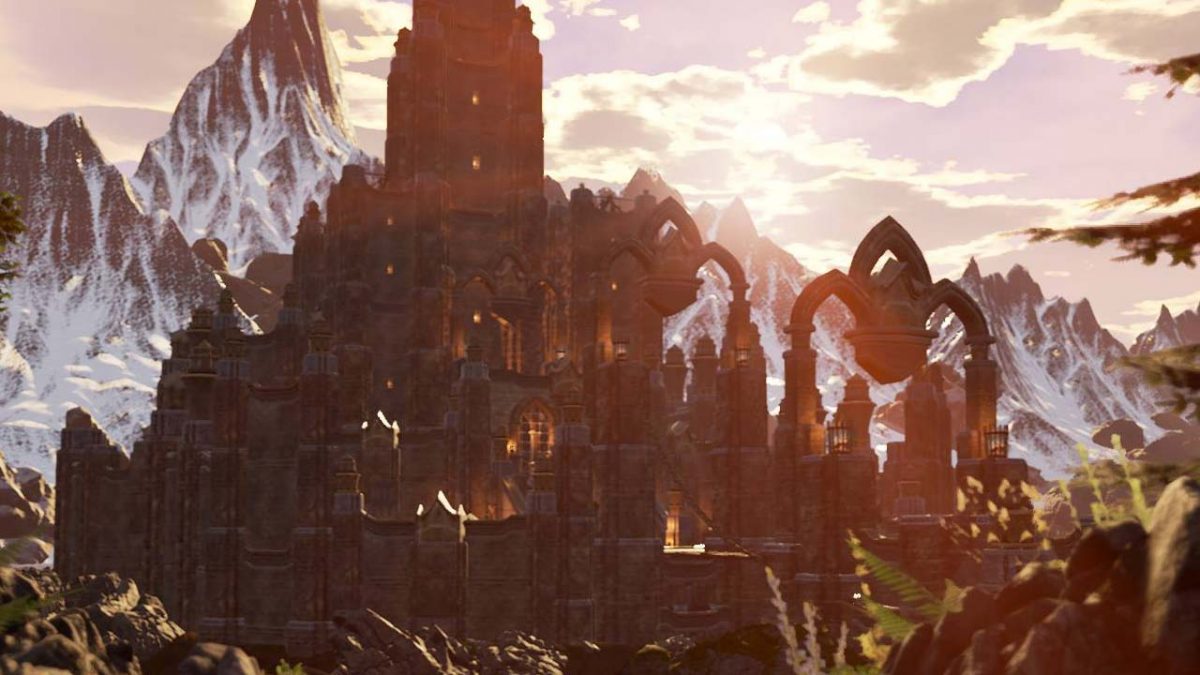Introduction
Learn more about AOCs most ambitious feature, allowing players to change the world of Verra, in our Ashes of Creation Node System Guide
General Node Information
Nodes in Ashes of Creation are pre-set zones on the world map that are wrapped up in a war of influence. There will be 85 regular node locations at launch and 15 additional castle nodes (see below for castle node information). As a player gains experience within that zone of influence, they gain experience for their character and the node.
Next, Let’s talk about each of the Stages of the Node System.
Node Progression
As nodes gain experience, they can form into towns of different sizes, totaling 7 variations: Wilderness, Expedition, Encampment, Village, Town, City, and Metropolis.
Stage 0 – Wilderness
Stage 0 of node progression. Every node will be a wilderness at launch. The node will be uninhabited and empty during this stage. Players will be able to advance to the next phase immediately once a players
Stage 1 – Expedition (Crossroads)
Stage 1 of the node advancement. When a node transforms into an Expedition node a small group of NPCs and their companions will show up. It will be inhabited by tents, campfires, etc.
Stage 2 – Encampment (Camp)
Stage 2 of node advancement. Once this stage is reached the number of NPC’s grows and the tents and other temporary structures become more semi-permanent structures. It will be occupied with wagons and simple tools such as a smokehouse. They will have larger tents and buildings constructed from local materials.
Stage 3 – Village
Stage 3 of node advancement. At this stage, the camp becomes a small frontier town. The structures become more permanent, a Government begins to form. Buildings are developed with more advanced materials, and a special building is unlocked at this stage which allows the unique utility to its node type (More on node types below)

Stage 4 – Town
Stage 4 of node advancement. Structures at this stage become even more permanent and it begin to feel well lived in and developed. Societies and Organizations start to snub the town with ranking structures for players to participate in.
Stage 5 – City
Stage 5 of node advancement. Once this stage is reached the node begins to feel very alive with bustling development and the accommodations of a major player hub. It is populated with every major element of civilization, such as temples, guild halls, and major embassies from other nodes that will be present if diplomacy prevails. At the City stage relics can also begin to appear within the vaults.
Stage 6 – Metropolis
Stage 6 is the final stage of node advancement. At the metropolis stage, the node is enormous. The Metropolis acts as the central hub for all things in its region. Every organization and religion will be represented, markets will connect the world, mansions and businesses will thrive, and the Metropolis will house a unique and powerful ability called a superpower that is determined by the node type (more on node types below). Due to how nodes relate to one another there can be a maximum of 5 metropolises in existence at any time on anyone server.
The size and growth of those towns depend on the contribution of the players and how far they have advanced the node. The advancement of a node unlocks its unique content but comes at the cost of locking out an increasing ring of neighboring nodes from progressing to the next stage. This system is the primary driving force for change in the world because it creates scarcity. The more advanced a node becomes the larger the node’s zone of influence grows.
Vassal Node System
Once a node advances to stage 3, the village stage, it begins to encroach on the nearby zones which make those zones into Vassals. Vassal nodes are owned by a parent node and must always remain at least one node stage below the parent node, which ultimately means that the Vassal node can not grow to the next node stage until the parent node advances.
As vassal nodes gain the experience they first apply that experience earned to the vassal node, but once the vassal node hits the cap and can not advance any further until the parent node advances the experience gained is then given to the parent node. If the parent node advances then the vassal node will then have the ability to advance once again.
Vassal nodes can advance to the village stage and can also have their own vassals as long as they fit within the parent node’s zone of influence. They are subject to the government, wars, taxes, alliances, and trade of their parent node.
A Vassal Node can not declare war on its parent node or any of its vassals, and the diplomatic states of the parent node bind citizens of vassals.
Types of Nodes
There are 4 different node types in Ashes of Creation, and each type will be easily identifiable at Node Stage 1, or the Expedition stage.
- Economic Node – Trade and Merchant Focuses
- Military – Combat and Class Training Focus
- Scientific – Artisan and Construction Focuses
- Divine – Faith, Skill, and Equipment Augment Focuses
Each one of the Node types has a superpower that becomes unlocked when it reaches the final stage of development – the Metropolis stage. Below is a list of the benefits of Each Node Type.
Economic Node
The Economic node is focused on trade and merchants, and the superpower of this node is the linked economy superpower. Economic nodes with this superpower share their auction house listings with all others. This means that items that are listed on the auction house in the linked Economy node can be bid on from any other linked economy node. Linked economies also connect a Metropolis and any Vassal Economic nodes belonging to that Metropolis.
Military Node
Intrepid Studios is still discussing the type of superpower granted to a military node. However, one of the contenders for the Military Metropolis would be access to a “hero” based cross-server competition for specific archetypes.
Scientific Node
Scientific nodes are focused on artisan classes and construction. The superpower granted to a Scientific node upon reaching the Metropolis stage is the Teleportation superpower. The citizens of a Metropolis scientific node may teleport between the metropolis and any of its vassal nodes, regardless of the stage of the vassal node, as long as the vassal node is not at war. If there are multiple scientific metropolises on a server then an airship will provide fast travel for the citizens of those nodes, and their vassals, between those scientific metropolises.
Divine Node
The superpowers of a Divine node are not known at this time.
Node Citizenship
Citizenship into a particular node can only be claimed once that node has reached stage 3, the village stage, of development. House ownership in the node grants the ability to claim citizenship within that node. (There is a possibility of a “citizenship ticket” mechanic in the future that can also grant a player citizenship into a node if player housing alone doesn’t adequately populate the node, but that mechanic will be determined after testing.)
A player can only claim citizenship to one node at a time, and only one citizenship may be declared per account, per server.

Citizenship within a node does grant the player benefits that would you would not otherwise have, including, titles such as, Mayor, priest, bishop, acolyte, patron guild leader, and chief bounty hunter. You also gain reputation, honor, loyalty, merit, and most importantly, participation in the node’s government.
Even though you gain the benefits of being a citizen, you will also have to pay taxes into the node that you are a citizen of. Mayors and Node Governments allocate resources, taxes, and quests to help develop the node’s defenses. The tax money received by the node can only be allocated towards funding the development of that node. The tax rates scale based on when a player joined the node as a citizen. This mechanic is in place to help avoid placing hard population caps on nodes as they advance. The idea is that as a node advances taxes become increasingly expensive which should, in turn, prevent the population of any one node from getting too large in number.
Node Governments
Once a node reaches stage 3, the village stage, of development a node government can then be chosen from a node’s citizenry.
Once stage 3 is reached a week-long cooldown period begins. The cooldown period is in place to allow players to establish citizenship in that particular node, and if necessary relinquish their citizenship in a different node to join the new one. After the cooldown period, the node elections begin. The election process lasts one week and will be every month thereafter. You will only be able to participate in an election if you are a citizen of the node.
Each node will also have a Mayor who serves as the leader of the node’s government and a city hall building where big decisions regarding the node are made. (The capabilities of the City Hall will also be available via a mobile and web interface.) It’s the job of the Mayor and the government to allocate resources, taxes, and quests to help develop the node’s defenses, as well as, coordinate the transfer of supplies with citizens operating caravans. Mayors are also in charge of communicating what resources are necessary for a particular node and then motivating the citizens to fulfill those needs, along with a hose of other leadership duties, which include; Building projects, tax allocation, hiring mercenary NPC’s to defend their node during sieges, initiate quest driven systems that non-citizens can participate in, and enter into trade agreements.
Ways Governors are chosen in each Node Type in Ashes of Creation
- Divine Node governments are chosen from citizens via service-oriented quests that prove their faith and dedication to that node.
- Economic Node governments can be bought and sold by the citizens with the most money.
- Military Node governments and mayors are chosen from citizens through gladiatorial arena-style combat.
- Scientific Node governments are elected democratically.
Node Wars
Nodes may declare war against each other. This places the nodes’ citizens and allies against each other in conflict. This Conflict will flag up any players that fall into these categories, starting the event. War can be declared at any time, though most objectives of the war will only happen during prime time for that server.
Alliances
Mayors of a node can ally with other nodes to facilitate trade and treaties. All details are unknown at this time, but we do know that Allies can help each other out in Node wars as well as set up trade routes between nodes.
Ashes of Creation Node System Conclusion
That Concludes our Ashes of Creation Combat Guide. We’ll update this guide as we learn more about the combat system! For more Ashes of Creation content, check out our home page.

